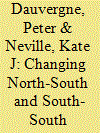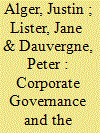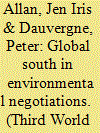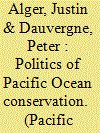|
|
|
Sort Order |
|
|
|
Items / Page
|
|
|
|
|
|
|
| Srl | Item |
| 1 |
ID:
090205


|
|
|
|
|
| Publication |
2009.
|
| Summary/Abstract |
Since the 2007 food crisis, controversy has engulfed biofuels. Leading up to the crisis, world-wide interest in these fuels-which include biomass, biogas, bioethanol, and biodiesel-had been surging as states increasingly saw these as a way to meet greenhouse gas reduction targets and promote sustainable economic development. Now some consumers, notably in Europe, are scaling back demand as they worry that biofuels are responsible for increased food prices and deforestation. In contrast, some states-particularly Brazil and the USA, the world's leading bioethanol producers-continue to promote biofuel development, especially in developing countries. Partnerships arising from these efforts, we argue, reflect new patterns in the international political economy, where trade relationships among developing countries are strengthening, and where economic lines between developed and emerging developing countries are blurring. Given previously observed patterns of resource exploitation involving complex webs of North-South and South-South trade (such as for resources like palm oil in Indonesia), we anticipate that the emerging political economy of biofuels will repeat and reinforce many of these same environmentally destructive trends.
|
|
|
|
|
|
|
|
|
|
|
|
|
|
|
|
| 2 |
ID:
184647


|
|
|
|
|
| Summary/Abstract |
A handful of companies dominate the world’s shipping industry. These firms have gained political leverage over the global governance of container shipping in particular. Intriguingly, in recent years the Danish conglomerate Maersk—the world’s biggest container and shipping vessel company since the mid-1990s—has been using its influence to push for higher environmental standards for the industry as a whole. To some extent these initiatives are helping to promote environmental efficiencies, cleaner fuels, and greener technology. But they are also raising costs for small and midsized companies with extremely low profit margins, further enhancing the competitiveness of the biggest shipping conglomerates in an increasingly oligopolistic market. While voluntary self-governance by companies such as Maersk is incrementally improving the environmental management of global shipping, it is also further concentrating governance power within a few transnational corporations, potentially taking more ambitious regulation off the agenda.
|
|
|
|
|
|
|
|
|
|
|
|
|
|
|
|
| 3 |
ID:
124177


|
|
|
|
|
| Publication |
2013.
|
| Summary/Abstract |
During international environmental negotiations developing countries have commonly employed a unified strategy through the G-77 and China (G-77/China). Compared with other negotiations, such as those on trade and security, this strategy has been relatively successful in securing financial and technical benefits. Unity among developing states is not, however, a characteristic of all environmental negotiations. This paper analyses the case of Reducing Emissions from Deforestation and Degradation plus conservation ( redd +), where unity has been absent. It argues that the negotiation positions, strategies and coalition politics from 2005 to 2013 have been a result of identifiable power asymmetries among developing states (shifting over time). Some states with vast forest resources have held an effective veto, while others have had considerable moral influence and expert authority. Coalitions have courted such relevant and reputational leaders. At the same time some developing states have had enough diplomatic capacity and economic power to stand alone in negotiations. Taking a broad, historical view of the diverse forest interests and power asymmetries among developing states helps to explain the recent stagnation in negotiations to establish an international redd+ mechanism to mitigate climate change.
|
|
|
|
|
|
|
|
|
|
|
|
|
|
|
|
| 4 |
ID:
152073


|
|
|
|
|
| Summary/Abstract |
Drawing on seventy-four interviews, this article analyzes the rising importance since the mid-2000s of large marine protected areas (MPAs) as a policy for managing ocean conservation. Governments have initiated eighteen large MPAs (over 200,000 km2) since 2006, reflecting the emergence of a new large MPA norm in marine conservation. This norm, we argue, emerged because of the success of a few transnational nongovernmental organizations (NGOs) in identifying politically feasible large MPAs, and then forming ad hoc domestic coalitions to lobby for them. This explanation is in contrast to most of the literature on how and why norms diffuse internationally, as well as existing explanations for the rise of large MPAs, both of which emphasize the importance of cohesive coalitions of transnational NGOs lobbying in multilateral venues. This bottom-up, international norm diffusion strategy has made large MPAs a viable policy option, one national jurisdiction at a time. For instance, this strategy was a critical element in convincing the UK to create the Pitcairn Islands Marine Reserve (835,000 km2) in 2015. Given the politics underlying the formation of large MPAs, where political gains have been high, and corporate and societal resistance relatively low, the creation of more large MPAs would seem likely, as occurred in 2016 when the UK announced it would designate three more large MPAs by 2020, totalling over 1.4 million km2. Growing support for large MPAs as a conservation strategy could also embolden states to establish large MPAs in more politically and economically contested waters, including on the Pacific high seas.
|
|
|
|
|
|
|
|
|
|
|
|
|
|
|
|
| 5 |
ID:
158738


|
|
|
|
|
| Summary/Abstract |
Theoretically, this article reveals the long-term risk for local non-governmental organisations (NGOs) of participating in transnational advocacy networks (TANs), accepting money from foreign sources and throwing ‘boomerangs’ internationally—a strategy used by local NGOs to seek international allies to pressure repressive and unresponsive states at home. Focusing primarily on the suppression of environmental NGOs that oppose natural-resource extraction, this article examines three cases—Russia, India and Australia—to illuminate the consequences of this trend for local civil society and TANs. It also documents a global trend towards states depicting local NGOs with international linkages as subversive agents of foreign interests, justifying legal crackdowns and the severing of foreign funding and ties. State framing of NGOs as agents of foreign interests is repressing local environmental activism, depoliticising civil society and weakening international NGO alliances—a conclusion with far-reaching consequences for the future of TANs, local NGOs and environmental activism.
|
|
|
|
|
|
|
|
|
|
|
|
|
|
|
|
| 6 |
ID:
113361


|
|
|
|
|
| Publication |
2012.
|
| Summary/Abstract |
Brazil's influence is rising quickly in international affairs. Unlike those of China and India, its foreign policy relies heavily on non-military power-a characteristic of Brazil since at least the early 20th century. A mainstay of this policy has been the pursuit of 'development' for Brazil and the global South, with domestic discourse on the need to 'develop' buttressing this approach. Foreign policy under President Lula (2003-10) did this explicitly; President Rousseff (2011-) shows no signs of changing course. This article analyses three foreign policy issues-South-South cooperation, health, and environment-to demonstrate the use and assess the value of this strategy. Not only is the strategy serving Brazil's national interests well, the analysis reveals, but it is also benefitting other developing countries (albeit asymmetrically), reinforcing Brazil's capacity to influence international affairs.
|
|
|
|
|
|
|
|
|
|
|
|
|
|
|
|
|
|
|
|
|